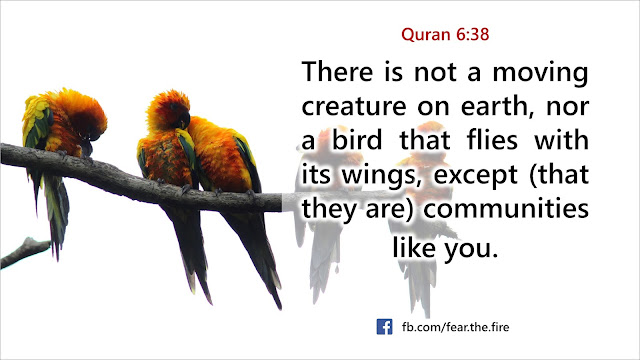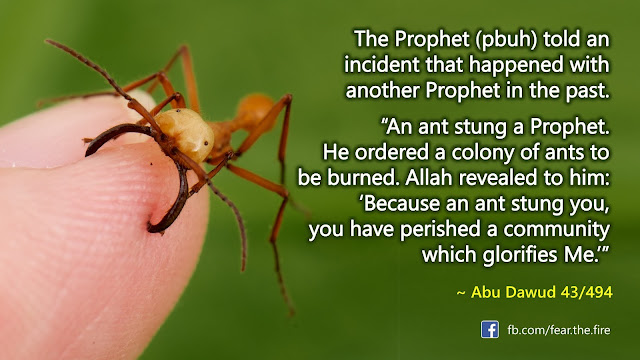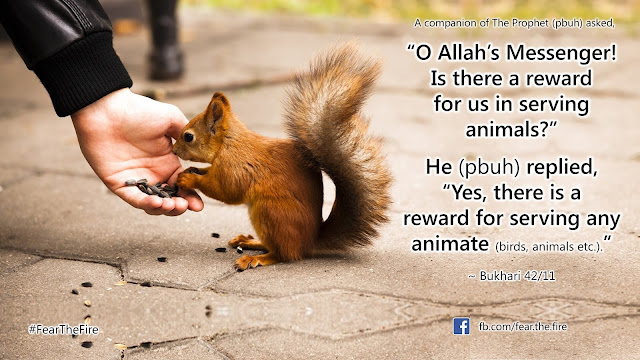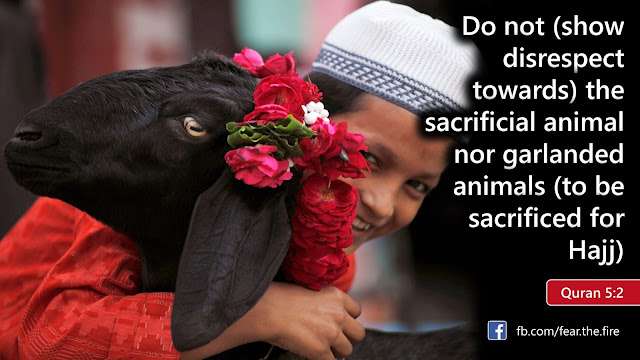Animal Care And Animal Rights Institutionalized By Islam 1400 Years Ago
Mohamad Mostafa Nassar
Twitter:@NassarMohamadMR
Long ago before the modern animal rights movement began in 1975, with the publication of Peter Singer’s book “Animal Liberation”, Islam demanded kindness to animals. It also warned that cruelty to animals will be a sufficient reason for a person to be thrown into the Hell Fire!
The Quran and guidance from Prophet Muhammad (pbuh) gives many examples and directives about how Muslims should treat animals. Islam prohibits cruelty to animals and considers mistreating animals a grave sin. Thus Islam commands Muslims to protect animals and treat them with respect.
A famous companion of The Prophet was given the name Abu Hurairah. The name Abu Hurairah means ‘father of the cats’. Abu Hurairah was given this name because wherever he went he always had a kitten with him.
The Quran describes that animals form communities, just as humans do. And as they submit themselves to Allah, glorify Allah and pray to Allah in their own way (see next section) it wouldn’t be wrong to say the living creatures are ‘Muslims’. Also as you read the post further you will realize that a person was granted Paradise because he helped a dog quench its thirst whereas another was destined to Hell because of torturing a cat. Thus in Islam the mercy extends beyond human beings to all creations of Allah. The Quran says:
There is not a moving creature on earth, nor a bird that flies with its wings, except (that they are) communities like you. ~ Quran 6:38

Every Animate and Inanimate Acknowledge & Glorify Allah
The Quran has six chapters named after animals ― Al-Baqarah (The Cow), Al-Anaam (The Cattle), Al-Nahl (The Bee), Al-Naml (The Ant), Al-Ankaboot (The Spider), Al-Feel (The Elephant). And there are short stories on some animals in The Quran – see here. Each of these provide wisdom and lessons to humans on how to lead life.
The Quran further states that everything that is created is in a state of submission to Allah and worships Him in a manner appropriate to its form and state. The sun, moon, stars, trees and animals are all in a state of subjugation to Allah and prostrate to Him, and all of them worship Him in an appropriate manner. The Quran says:
Do you not see that everyone in the heavens and the earth glorifies Allah including the birds with wings spread out? Each one knows his Salah (prayer) and method of glorification. And Allah has knowledge of what they do. ~ Quran 24:41

Elsewhere The Quran says:
The seven heavens and the earth and all that is therein glorify Him and there is not a thing but glorifies His Praise. But you understand not their glorification. Truly, He is Ever Forbearing, Oft-Forgiving ~ Quran 17:44
Thus Quran makes it clear that even animals glorify Allah; but we are not capable to understand their glorification. See the detailed article here. With that we can infer that animals can be called as Muslims as they believe in Allah and glorify Him. Given their submission it becomes extremely important to treat every animate being with care and respect. The Prophet (pbuh) narrated an incident that happened to another Prophet in the past.
An ant stung a Prophet. He ordered a colony of ants to be burned. Allah revealed to him: “Because an ant stung you, you have perished a community which glorifies Me.” ~ Abu Dawud 43/494

Prophet Muhammad (pbuh) Guidance on Animal Care
The Prophet (pbuh) often chastised his Companions who mistreated animals, and spoke to them about the need for mercy and kindness. There are several examples of hadith which instruct Muslims on how to treat animals. Here’s one authentic Hadith where The Prophet (pbuh) narrated how Allah was pleased with a person and forgave him because he fetched a thirsty dog with water.
While a man was walking on a road, he became very thirsty. Then he came across a well, got down into it, drank (of its water) and then came out. Meanwhile he saw a dog panting and licking mud because of excessive thirst. The man said to himself, “This dog is suffering from the same state of thirst as I did.” So he went down the well (again) and filled his shoe (with water) and held it in his mouth and watered the dog. Allah thanked him for that deed and forgave him.”
The people asked, “O Allah’s Messenger (pbuh)! Is there a reward for us in serving the animals?” He said, “(Yes) There is a reward for serving any animate (living being).” ~ Bukhari 78/40

In another narration, The Prophet (pbuh) said,
A prostitute was forgiven by Allah, because while passing by a panting dog, near a well and seeing that the dog was about to die of thirst, she took off her shoe, and tying it with her head-cover she drew out some water for it. So, Allah forgave her because of that. ~ Bukhari 59/127

On another occasion, The Prophet (pbuh) described Allah’s punishment on a woman who was sent to Hell because of a cat.
A woman was tortured and was put in Hell because of a cat which she had kept locked till it died of hunger.” Allah’s Messenger (pbuh) further said, (Allah knows better) Allah said (to the woman), ‘You neither fed it nor watered when you locked it up, nor did you set it free to eat the insects of the earth. ~ Bukhari 42/13

The Prophet (pbuh) advised his companions:
A good deed done to an animal is as meritorious as a good deed done to a human being. While an act of cruelty to an animal is as bad as an act of cruelty to a human being. ~ Mishkat 6/8/178

Umar (ra), one of the close companions of The Prophet (pbuh) and the second rightly guided Khalifah of Muslims disliked making animals fight against each other. That’s because the fight results in harm to the animal, and it may lead to it being killed for no legitimate purpose. One of the reports suggests The Prophet (pbuh) forbade setting animals to fight against one another.
The Prophet (pbuh) forbade taking animals as targets. ~ Nasai 43/78

Select Few Nuggets from The Prophet (pbuh) on Animal Rights
The Prophet (pbuh) said:
If you let loose (with Allah’s name) your tamed dog after a game and it hunts it, you may eat it, but if the dog eats of (that game) then do not eat it because the dog has hunted it for itself. ~ Bukhari 4/41
A companion of The Prophet (pbuh) said:
We were with the Messenger of Allah (pbuh) during a journey. He went to ease himself. We saw a bird with her two young ones and we captured her young ones. The bird came and began to spread its wings. The Messenger of Allah (pbuh) came and said: Who grieved this (bird) for its young ones? Return it’s young ones to it. ~ Abu Dawud 15/199
The Prophet (pbuh) said:
When you journey through a fertile land, you should give the camels a chance to graze in the land. When you travel in an arid (land) where there is scarcity of vegetation, you should quicken their pace (lest your camels grow feeble and emaciated for lack of fodder). When you halt for the night, avoid (pitching your tent on) the road, for it is the the pathways of nocturnal creatures. ~ Muslim 33/254
A companion of The Prophet (pbuh) said:
Umar happened to pass by some young men of the Quraish who had tied a bird (and made it a target) at which they had been shooting arrows. Every arrow that they missed came into the possession of the owner of the bird. So no sooner did they see Ibn Umar they went away. Thereupon Ibn Umar said: “Who has done this? Allah has cursed him who does this. Verily Allah’s Messenger (pbuh) invoked curse upon one who made a live thing the target (of one’s marksmanship).” ~ Muslim 34/91
The Prophet (pbuh) said:
Do not cut the forelocks, manes, or tails of horse, for their tails are their means of driving flies, their manes provide them with warmth, and blessing is tide to their forelocks. ~ Abu Dawud 15/66
Forbidden to Kill or Trade or Cause Harm for Certain Species
In few narrations The Prophet (pbuh) ordered that bees should not be killed or burnt. We know bees pollinate majority of our crops. Today researchers suggests that fewer bees will cause food supply to shrink and their extermination could set off a global food crisis. In the last few years several articles were published on why bee conservation is important. See BBC video here.
1400 years ago The Prophet (pbuh) advised:
Do not burn bees and do not scatter them. ~ Muwatta Malik 21/971

In another narration the Prophet (pbuh) prohibited to kill four creatures: Ants, Bees, Hoopoes, and Sparrow-hawks. ~ Abu Dawud 43/495

In another narration The Prophet forbade to kill frogs even for medicinal use. ~ Abu Dawud 43/497 | Nasai 42/93

Trading dogs or cats for money: Selling a dog or a cat for money is forbidden. It is not permissible to sell cats, monkeys or dogs, or any other carnivores that have fangs, because the Prophet (pbuh) forbade that and discouraged it.
The Prophet (pbuh) forbade the price of a dog, the wages of a prostitute and the fee of a fortuneteller. ~ Bukhari 2083 | Muslim 2930. Thus

In another narration The Prophet (pbuh) forbade taking a price for animal copulation. ~ Bukhari 37/24.

Doing business for monetary gain by the means of copulation or by selling cats and dogs is forbidden in Islam.
Then Why Do Muslims Kill Animals for Food?
Meat-eating is not mandatory in Islam. It is perfectly fine if a Muslim chooses to be a vegetarian! Islam strictly prohibits killing of animals/birds for sports and leisure. Similarly unnecessary destruction of trees and plants is also disliked by the Sharia. Killing an animal which is not for food is forbidden.
On the other hand ‘sacrifice‘ is not the same as killing. That’s because Allah has created everything for the benefit of mankind, The Almighty has allowed certain animals to be sacrificed for food; however before slaughtering the animal one must take Allah’s name.
If one doesn’t invoke Allah before the sacrifice the same Halal animal becomes Haram (forbidden) for a Muslim to eat. Slaughtering an animal has to be done with due care and per method prescribed. Causing mental and physical pain and suffering to the creatures of Allah is not justifiable under any circumstances. Islam insists that the manner of slaughter should be least painful to the animal. This include:
- Animals who are raised for sacrifice must be treated well.
- Before sacrifice they are to be fed with water.
- Animals must not see other animals being sacrificed.
- The knife must be sharp but it must not be sharpened in the animal’s presence.
- The whole neck is not slit but only part of it. The spine is not cut until the animal bleeds out.
- Muslims must call out Allah’s name before slaughtering an animal.
The Prophet (pbuh) said:
Indeed Allah has decreed Ihsan (kindness and excellence) in everything. So when you kill, then do the killing well, and when you slaughter, then do the slaughtering well. Let one of you sharpen his blade, and let him comfort his animal (before slaughtering). ~ Tirmidhi 16/25
It is recorded from an authentic narration that The Messenger of Allah (pbuh) came upon an emaciated camel and said:
Fear Allah regarding these dumb animals. Ride them when they are in good condition and sacrifice them when they are in good condition (healthy). ~ Abu Dawud 15/72
Quran categorically and clearly states:
Do not (show disrespect towards) the sacrificial animal nor garlanded animals (to be sacrificed for Hajj) ~ Quran 5:2

Carol O’Neil, Professor of Nutrition and Food Sciences at Louisiana State University Agricultural Center, states that “Halal practices may be more humane for the animal …” In another study by Professor Schultz and his colleague Dr. Hazim of the Hanover University, Germany proved that “Islamic slaughter is THE humane method of slaughter.” And there are sections of the media that emphasizes why Halal meat is far better than their counterparts. And experts say Halal meat is more tender, and less cruel,
Islamic System of Justice
Even though animals are creatures that have no responsibilities, they will settle their accounts with one another on the Day of Judgment, if one had wronged the other in this world. As a matter of fact, The Prophet (pbuh) stated that no injustice will remain unrequited in the Hereafter by saying ‘Every right holder will be given his right.
Even hornless sheep’s right will be taken from the horned sheep through retaliation.’ Meaning those who were oppressed in this world, the claimants would get their claims on the Day of Resurrection so much so that the hornless sheep would get its claim from the horned sheep. When there is nothing left to be settled, Allah will say to them (the animals), ‘Be dust.’
The Prophet (pbuh) said:
All rights will be restored on the Day of Judgment, to the extent that even the hornless sheep will be allowed to avenge from the horned sheep. ~ Muslim 2582

So the point here is to demonstrate to people that rights will not be neglected, rather the rights of the oppressed will be settled at the expense of the oppressor. An oppressor can be a tyrant ruler or a community leader or anyone for that matter. They will not be under the shade of Allah in Qiyamah.
Thus Islam expressly lays down rights for animals entitling them to the right of love and mercy. Cruelty to animals in Islam is treated with grave contempt and the harshest of penalties, the fire of hell is accorded any individual whoever dares to be cruel to animals.
Through these rules and regulations legislated in regards to animals, the Muslims gains the respect and understanding that other creatures are not to be used and abused as one wills, but that they, like humans, have rights which must be given in order to ensure that the justice and mercy of Islam be met to all which inhabit this earth.
So whoever harms an animal has to repent to Allah for that, because The Almighty who created the animals is the one Who has commanded us to be kind towards them, unless they are harmful.
Allah knows Best.